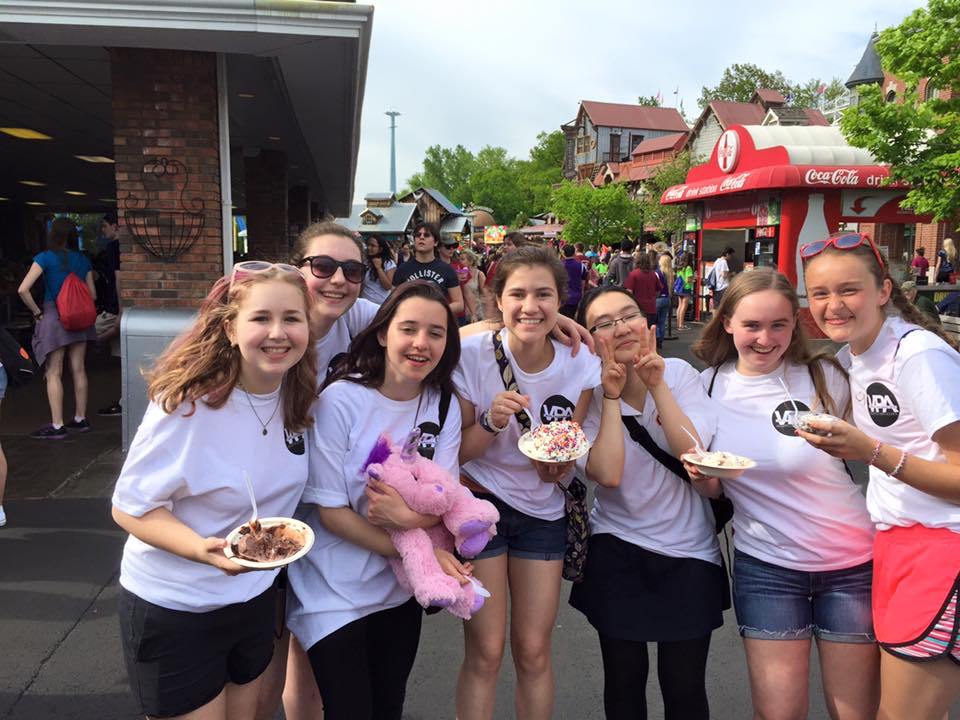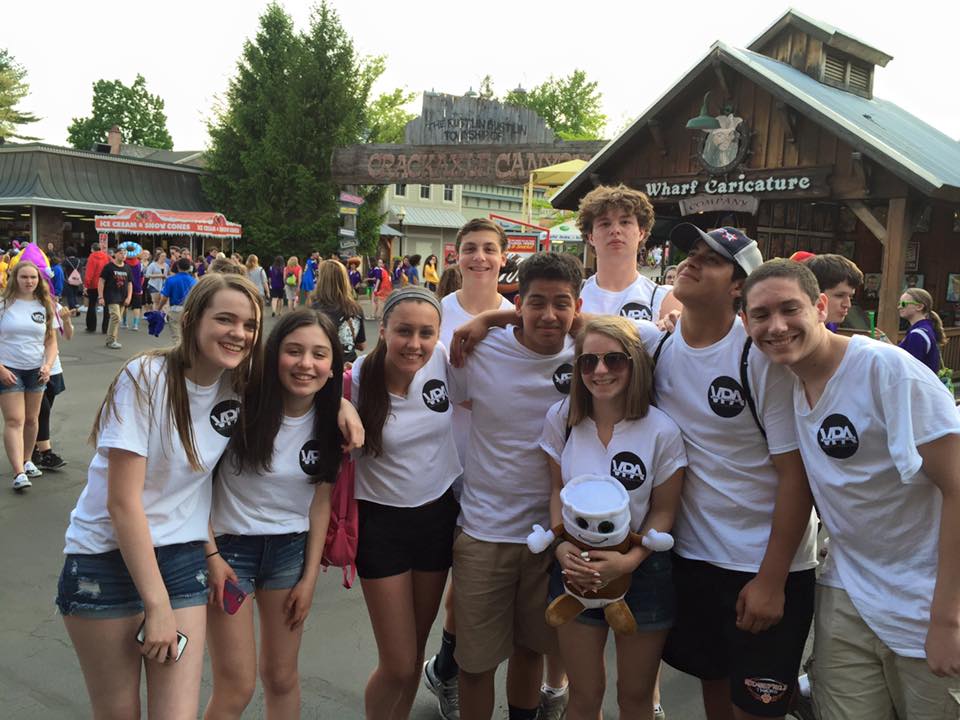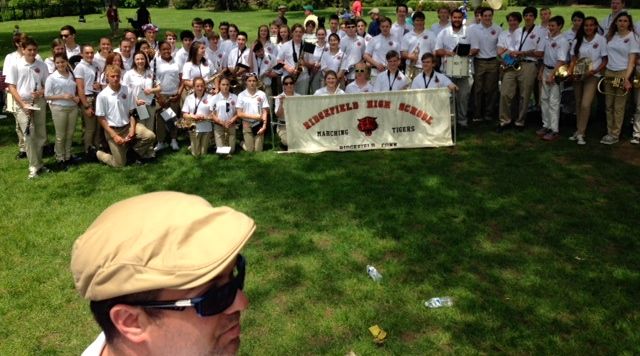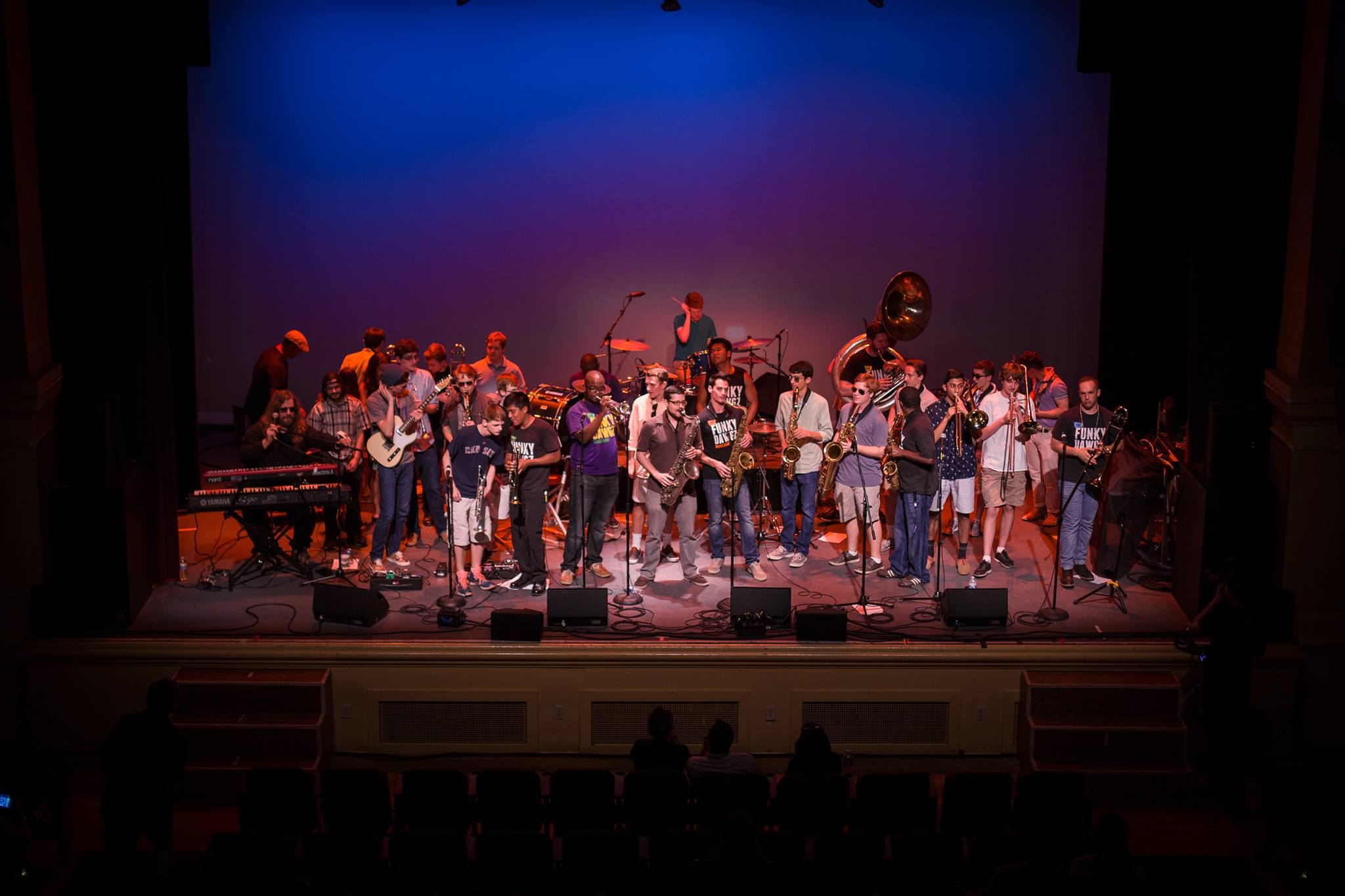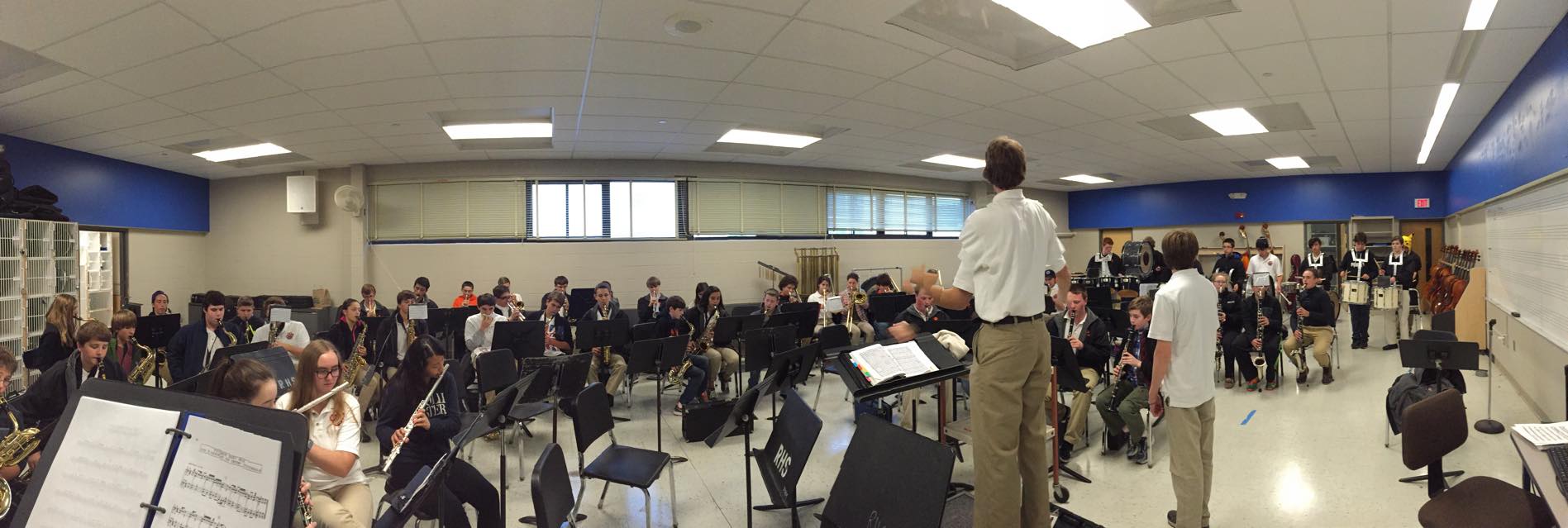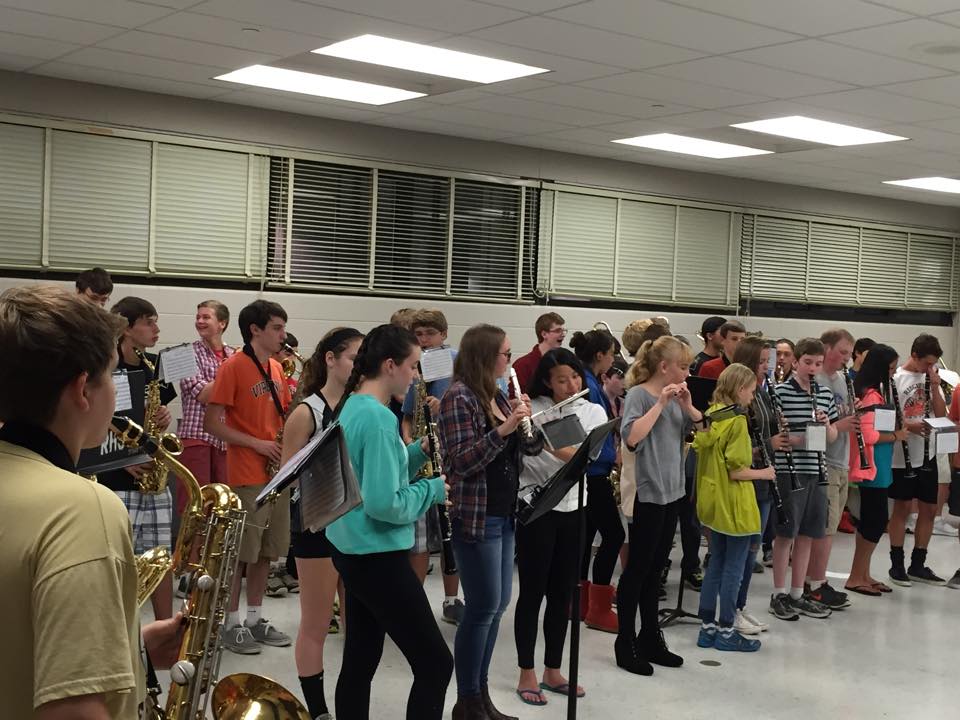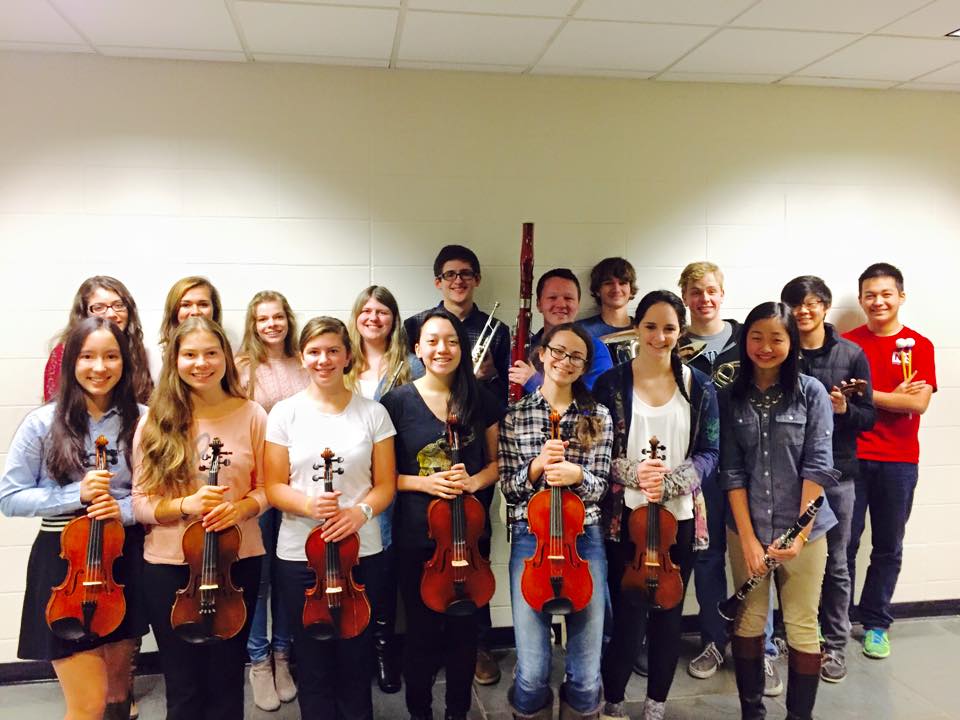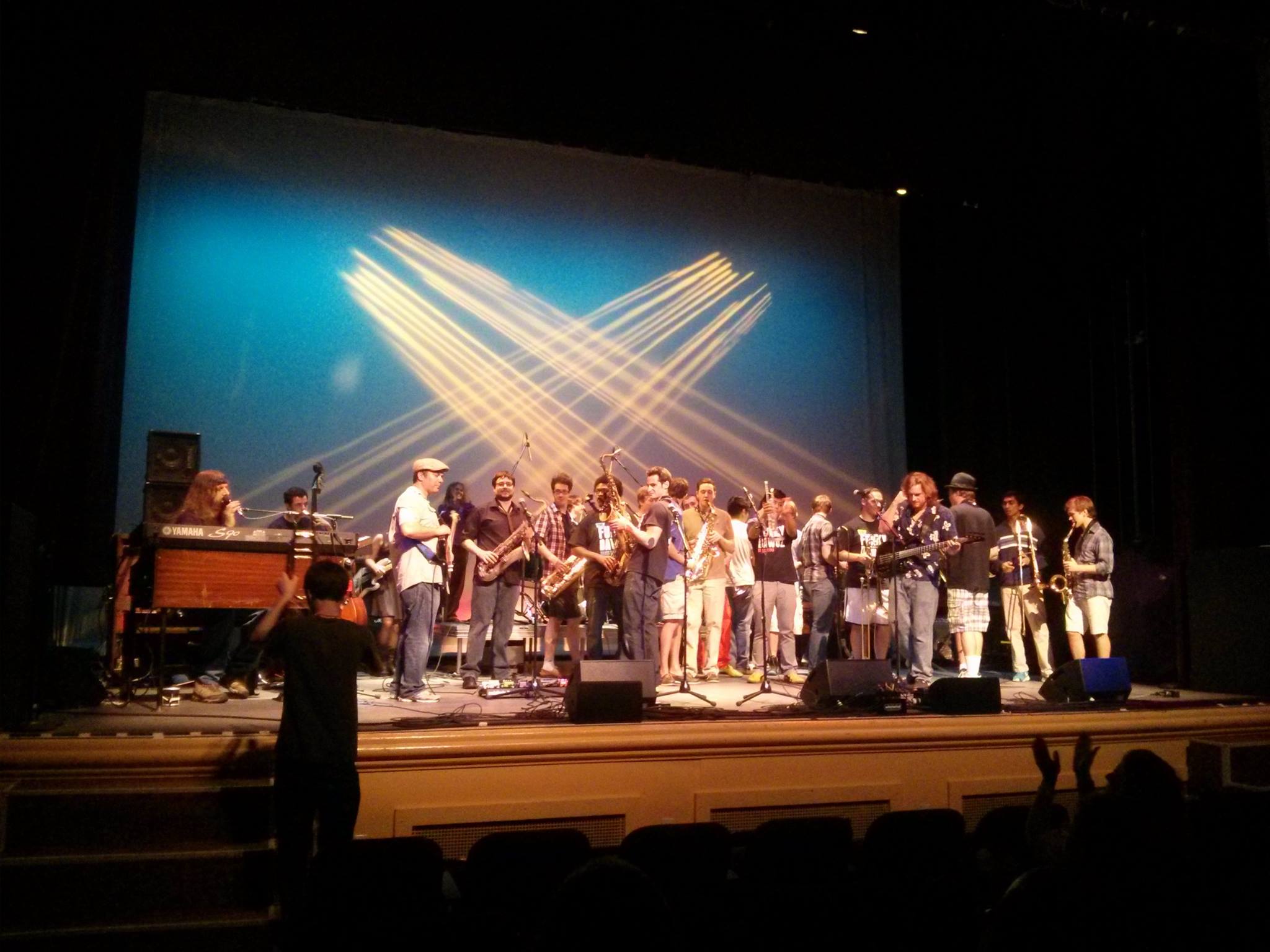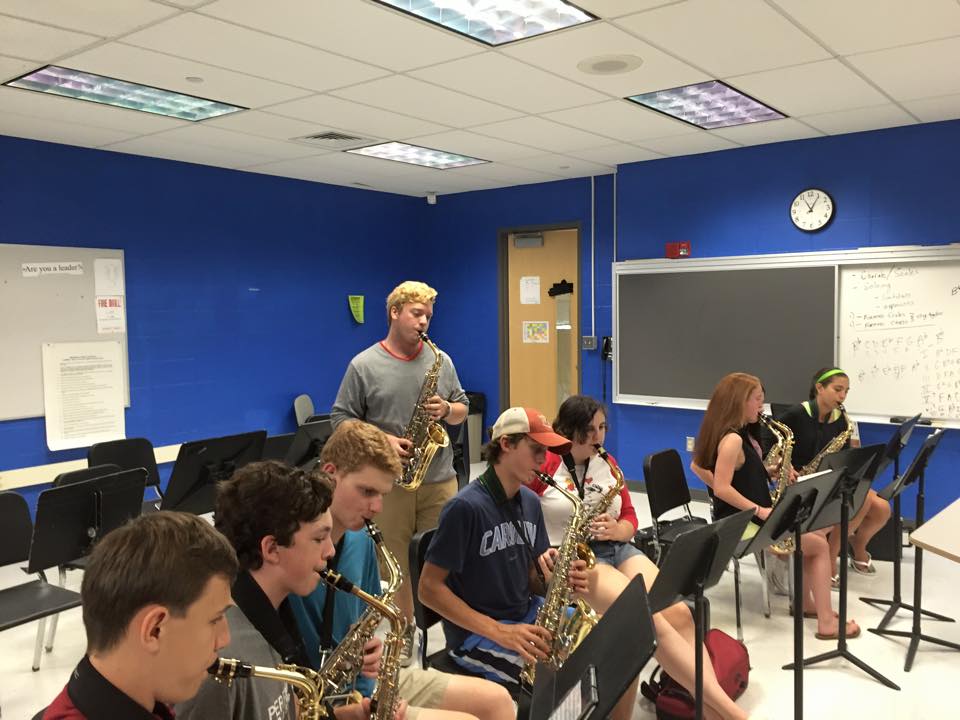Why You SHOULD Continue Music at RHS
Thank you for visiting our page. We hope you find a lot of useful information and get a sense for both the quality we produce and the fun we have.
If
music is something you are good at and enjoy, you should continue with it.
We have something for everyone here at RHS in the music department.
The video below is
what our students have to say about our program. This video was done entirely by RHS Band and Orchestra students. They took questions from
a survey given to the kids at ERMS and SRMS. We looked for frequently
recurring questions that middle school students had about our program, and then came up with these answers:
Hopefully
that video explains all of the wonderful things we have to offer. It
certainly does a better job than any written words can.
Why
You SHOULDN'T Give It Up
Some
times people give up music for the wrong reasons. If you don't enjoy it
or have a true and more intense passion in something else, such as art,
theatre, etc...then you should absolutely make that decision and pursue your
other interests and leave music behind. But whatever you pursue, make
sure you are doing it for the right reasons.
Too
often, kids who love music and are good at it are steered away from it for the
wrong reasons. They worry about their grades, time management, and skill
level. They worry about fitting it into their schedules and still being
able to pursue other areas of interest while fulfilling graduation
requirements. They want to look competitive for college. They want
to have their friends in their classes.
The
fact is that music will actually help you manage your time. You will be
surrounded by other kids who perform academically above the school average.
You will find that this is one of the most accepting groups of great kids
in the whole school and you will meet old friends and make new ones. You will
find that music DOES help you have a competitive transcript for college, and we will prove it to you. Graduates of our program have gone on to Yale, Brown, Dartmouth, Penn State, Tufts, Bard, NYU, Boston University, and many other extremely reputable colleges. In some cases, it made all the difference in our students being accepted to these schools (and they weren't music majors). You will find that you CAN fit it in to your schedule with planning and still
be able to pursue outside interests, and we are here to help you do it! I have become very adept at helping students navigate their schedules effectively to be able to take music all 4 years and still double up on math, science, and other electives.
Here
are some common concerns and misconceptions from incoming freshmen based on 5
years of surveys from students that did NOT continue.
"Will I be able to fit it in my schedule?"
That's
not true. Students here can take band, orchestra, or choir for all 4
years if they want to and still easily meet all graduation requirements. It is
possible to take a performance class for all 4 years and still have up to 3.5
credits available for open electives (meaning take anything you want).
See the "How To Schedule Music over 4 Years":
"But
I only get one elective as a Freshman at RHS. When will I get to explore other options?"
That's
true. This is the first time in your life that you've been able to decide
for yourself what class do you WANT to take. Many kids leave music
because they want to try something new, but then never come back. But ask
yourself: what's better for ME? Do I enjoy playing? Did I play reasonably well in middle school? What would look better on my college application...that
I took all random electives...or that I took music (or art, insert other passion here, etc.) from 4th to 12th grade?
Sticking with it shows commitment to something for the long haul, and
colleges know that musicians are a special breed of people when it comes to
creative thinking, time management, academic success, and interpersonal skills
(supporting info below).
Trying
new things is extremely important...but you don't have to start doing that as a
freshman. The only reason freshman year is so restricted is because RHS
wants you to get your graduation requirements out of the way early so you're
not freaking out about meeting them as an upperclassman. In your sophomore year, you get
an additional open half credit, and an additional 2 credits your Junior and senior year. That's 4.5 credits worth of courses that are totally
open...that's 7 half year classes to experiment with! It doesn't have to
be done as a freshman.
"But
I will be involved in sports. Will I have time?"
Yes,
you will. Most of the students in band and orchestra play sports, and
most of the ones that do play a sport do so for
all three seasons. We have an absolutely outstanding athletic program at
Ridgefield High School. Part of what makes it outstanding is its respect
and understanding of student commitments to other school activities, such as
music. Coaches and music teachers work together and are flexible with one
another to allow students the time they need to do both without being punished.
The music commitments outside of school are very infrequent. No coach has ever given any student a problem with attending a rehearsal or concert.
"Since
I am not planning to become a professional musician, is there really a point to continuing with it?" Music
is just another intellectually stimulating activity that works your mind
differently and more uniquely than any other subject (some examples at the
bottom of the page). Don't fall into the trap of looking at everything you do
as training for a career or building your resumé. You will have plenty of time to work the rest
of your life, and taking music has never derailed anyone from their dreams.
In fact, it only helps. "I
want to go to a competitive college in a certain field, so won't taking music courses be a waste?" Music
courses are a way to distinguish yourself from others in the school.
About 10% of students at RHS participate in the music program. By
contrast, aorund 60-70% play a sport in any given year. Both are valuable experiences, but it's nice
to have something special that sets you apart. There
are also other misconceptions about what looks good on your transcript.
You do not need to take specific courses to track you for a career. MIT is not necessarily going to take the kid that took every science course at RHS over the kid that took a few science courses and stuck with their music. In fact, most top schools also have bands and orchestras, and music can be your ticket into a school. To continue with the MIT example, they have one of the best orchestra programs around! The
idea behind your first two years of high school is to get as many graduation
requirements out of the way as possible so that you can use your junior and
senior year to explore possible career paths and focus on the college
application process. If you enjoy music but want to do other things:
Be patient...you'll get your chance to try them out as early as sophomore
year. This is
one of the few times in your life that you get to do something you enjoy.
If you made it this far, it is probably because someone directed you to
this page because they see that you have something special with music and they
believe that you love it and/or have a great ability with it. Never give
up doing something you love. This applies to your other interests.
Maybe music isn't as much your thing as art. So dive into art
classes and get as much out of them as you can. You will never again in
your life have the time or opportunity to pursue your personal passions like
you do now. Don't short change yourself what you love. Maybe it's
another subject, and that's OK!!! But do what you love and you will never
go wrong. "But what if I don't have enough time?" Nothing
at the high school meets outside of school except for concerts or voluntary
musical activities. It is all done right in school, and the class meets
every day, so you get a lot of practice in school. If you performed well
at the middle school, there is no reason to think that you won't perform well
at the high school. From a time management perspective, all of our
students live rich, full lives and manage to pull it off. If it's
something you want to do, you'll be able to do it! All the best, -Mr. Mac Top 10 Reasons to Continue Music at RHS 1.
We’re awesome! See
links: Orchestra Jazz
Band Concert Band 2.
Looks good on your college applications. 1500
students at RHS participate in a sport. It's almost a prerequisite, and
is an awesome part of the culture at RHS. However, only about 225 students
participate in music. It's a great way to distinguish yourself from your
peers and have something that the majority of students do not. 3.
We have a great time. Just ask kids that
are in the program. 4.
De-Stressor built into the school day Instead
of taking an elective that might be more academic in nature that requires a lot
more stress, you can decompress and play music. Over 90% of our music
students say that they look forward to coming to music classes because they can
forget about everything else for a little while and work on something that’s
fun to do and relaxing. 5.
Increases your SAT scores. Music
has been proven to have a direct correlation to success on standardized test
scores, including the SATs. There are many studies listed below. 6.
Continuity Adjusting
to high school is something a lot of 8th graders worry
about. This would be a great way to ease the transition and give you some
stability with something you’re already familiar with, and with people you
know. 7.
It’s Rewarding! In
addition to all of that, you can’t help but feel proud of yourself after
participating in one of our performance events. 8.
Music Makes you Smarter Well into
your early adulthood, your brain continues to develop. Your IQ is capable
of being increased until somewhere between 18-22. Playing music fires
more neurons in the brain than just about any other intellectual
activity. Specific research cited below. 9.
All of Your Friends are doing it. Well,
maybe not all! But a lot of them will. It’s a great way to make new
friends from the other middle school, see your old friends in the same place,
and make some new friends with kids that are in older grades. It’s quite
a unique and bonding experience, and we hope you will want to become a part of
it! 10. All of the
research below that says it's good for your brain! Higher
Test Scores Music
students out-perform non-music on achievement tests in reading and math. Skills
such as reading, anticipating, memory, listening, forecasting, recall, and
concentration are developed in musical performance, and these skills are
valuable to students in math, reading, and science. A
ten-year study indicates that students who study music achieve higher test
scores, regardless of socioeconomic background. Strengthening
the other Academic Disciplines Music
is all the subjects wrapped up into one. Reading
is interpreting symbols to sound. So is reading music. Good readers
have a good flow with appropriate pauses and inflections when
they read aloud. In music, we call this rhythm, phrasing,
articulation, and dynamics. Mathematics
is defined as "the systematic treatment of magnitude, relationships
between figures and forms, and relations between quantities expressed
symbolically." In music, the figures are the notes. The forms
are the structure of an entire piece. The relations between quantities
expressed symbolically are measures, with each note contained therein being a
specific unit of defined time in relation to a constant pulse. No
wonder students of music (particularly string orchestra) perform 22-25% higher than the national average on SATs. Music
is science, particularly physics. The system of tuning and our 12 tone
system is based around the Fibonacci
Sequence. The frequency of pitch is very
specific. Without dividing the string into the right proportion with our
fingers when playing, melody as we know it would not exist. It would
sound like dying cats. Harmony? That glorious resonance that occurs
only when we are perfectly in tune playing different notes? Simple
physics. The major chord...the fundamental element of our
harmonic system...is built on three notes whose amplitudes are of the
ratio 6:5:4. Elegance in simplicity creating beauty. That's how
Einstein stumbled on his laws of relativity. Music
is physical education and motoric. The bow hand, the left hand, using
both hands if you're a wind player, tapping the foot, the reading, the physical
mechanics of synching all of those things up... ...the
counting of the rhythm, the physics of the intonation, the lyricism of
phrasing, articulation, and dynamics...you're literally learning all the
subjects simultaneously. The ultimate brain food. In fact... No Other Subject is as good
for your brain. Researchers find Active
Music Making Expands the Brain In the April 23, 1998 issue
of Nature, Researchers at the University of Munster in Germany reported their
discovery music lessons in childhood actually enlarge the brain. An area used
to analyze the pitch of a musical note is enlarged 25% in musicians, compared
to people who have never played an instrument. The findings suggest the area is
enlarged through practice and experience. The earlier the musicians were when
they started musical training, the bigger this area of the brain appears to
be. Research
made between music and intelligence concluded that music training is far
greater than computer instruction in improving children’s abstract reasoning
skills.(Source: Shaw, Rauscher,
Levine, Wright, Dennis and Newcomb, “Music training causes long-term
enhancement of preschool children’s spatial-temporal
reasoning,” Neurological Research, vol. 19, February 1997 ) The
University of Montreal researched brain imaging techniques to study brain
activity during musical tasks. Researchers concluded that sight-reading musical
scores and playing music “activate regions in all four of the cortex’s lobes”
and “parts of the cerebellum are also activated during those tasks.” (Source: J. Sergent, E. Zuck, S. Tenial, and B. MacDonnall (1992).
Distributed neural network underlying musical sight reading and keybpard
performance. Science, 257, 106-109. ) Researchers
in Leipzig discovered through the use of brain scans that musicians had larger
planum temporale, the region of the brain associated with reading skills. Also,
musicians had a thicker corpus callosum, the nerve fibers that connect the two
halves of the brain. (Source:
G. Schlaug, L. Jancke, Y. Huang, and H. Steinmetz (1994). “In vivo morphometry
of interhemispheric asymmetry and connectivity in musicians.” In I. Deliege
(Ed.), Proceedings of the 3rd international conference for music perception and
cognition (pp. 417-418), Liege, Belgium.
) Students
who can perform complex rhythms can also make faster and more precise
corrections in many academic and physical situations, according to the Center
for Timing, Coordination, and Motor Skills A 1997
study of elementary students in an arts-based program concluded that students’
math test scores rose as their time in arts education classes increased. First-grade
students who had daily music instruction scored higher on creativity tests than
a control group without music instruction. In a
Scottish study, one group of elementary students received musical training, while
another other group received an equal amount of discussion skills training.
After six (6) months, the students in the music group achieved a significant
increase in reading test scores, while the reading test scores of the
discussion skills group did not change. According
to a 1991 study, students in schools with arts-focused curriculums reported
significantly more positive perceptions about their academic abilities than
students in a comparison group. In a
1999 Columbia University study, students in the arts are found to be more
cooperative with teachers and peers, more self-confident, and better able to
express their ideas. These benefits exist across socioeconomic levels. In a
2000 survey, 73 percent of respondents agree that teens who play an instrument
are less likely to have discipline problems. Music
will help you get into college and give you an edge in competition for
scholarships. College
admissions officers continue to cite participation in music as an important
factor in making admissions decisions. They claim that music participation
demonstrates time management, creativity, expression, and open-mindedness. Employers
look favorably upon musicians. One in
three of today’s school-aged children will hold an arts-related job at some
time in his or her career. It's
true. To
paraphrase a remarkable music educator from Virginia named Anne Rupert:
It has been said by an employer, a lawyer with his own practice and team of
lawyers that work for him, that there are two activities that really say a lot
about a person...being a boy or girl scout throughout high school, or being a
musician. These two activities show dedication and that you can do
something for the long haul. They show that you can take one thing, focus
on it, and be good at it. Both of these activities show teamwork and the
ability to work with others. By being a musician, you declare
yourself a proven intellectual and someone who has substance of character
and focus. You have proven that you have class and are
sophisticated. You have proven that you can work as part of a group to
accomplish something. You have also proven that you can sit down and pay
attention to something for more than 20 minutes! These are qualities
found in good people, and that's what it's all about. We're not just
making music when we teach kids...we're making people.
With that rationale, you should also consider not taking most of your classes. If you
were planning to become a scientist, why are you taking English and Social
Studies classes? The purpose of education is to teach your brain to think
in many different ways, not to train you for a career. That's something
teachers and politicians have been disagreeing on lately. Teachers are
more of the mindset that if you are a self-directed, self reflecting learner (see RHS mission statement),
you will be able to master any career because of your ability to think
critically. Some of the world's most brilliant people were/are musicians: Steve Jobs, Benjamin Franklin, Thomas Jefferson, Albert Einstein (who also said he broke through with his general relativity theory while playing the violin), Bill Clinton, MLB player Bernie Williams, NFL quarterback Joey Harrington, Richard Nixon, Condoleeza Rice, and many more people.
MIT Orchestra
A private French Horn teacher recently told me a story about one of his students. She had applied to Stanford University, and as part of her application sent in a musical supplement and called the band director. The band director called her up and was impressed with her recording, and asked her to play for him when she next visited the school. She did, and he was impressed with her, and told her to keep him in the loop about the admissions process. She was not admitted, so she called the band director to thank him for his time. He called her back two days later with not only the news that he got her admitted, but a $10,000 scholarship.
- B. Friedman, “An Evaluation of the Achievement in Reading and Arithmetic
of Pupils in Elementary
School Instrumental Music Classes,” Dissertation Abstracts International.
- Dr. James Catterall, UCLA.
- Rhythm seen as key to music’s
evolutionary role in human intellectual development, Center for Timing,
Coordination, and Motor Skills, 2000.
- “Arts Exposure and Class
Performance,” Phi Delta Kappan, October, 1998.
- K.L. Wolff, The Effects of General Music
Education on the Academeic Achievement, Perceptual-Motor Development, Creative
Thinking, and School Attendance of First-Grade Children, 1992.
- Sheila Douglas and Peter
Willatts, Journal of Research in Reading, 1994.
- Pamela Aschbacher and Joan
Herman, The Humanitas Program Evaluation, 1991.
- The Arts Education Partnership, 1999.
- Americans Love Making Music – And Value Music
Education More Highly Than Ever, American Music Conference, 2000.
- Carl Hartman, “Arts May Improve Students’ Grades,” The Associated Press,
October, 1999.
- Education Commission on the States

















